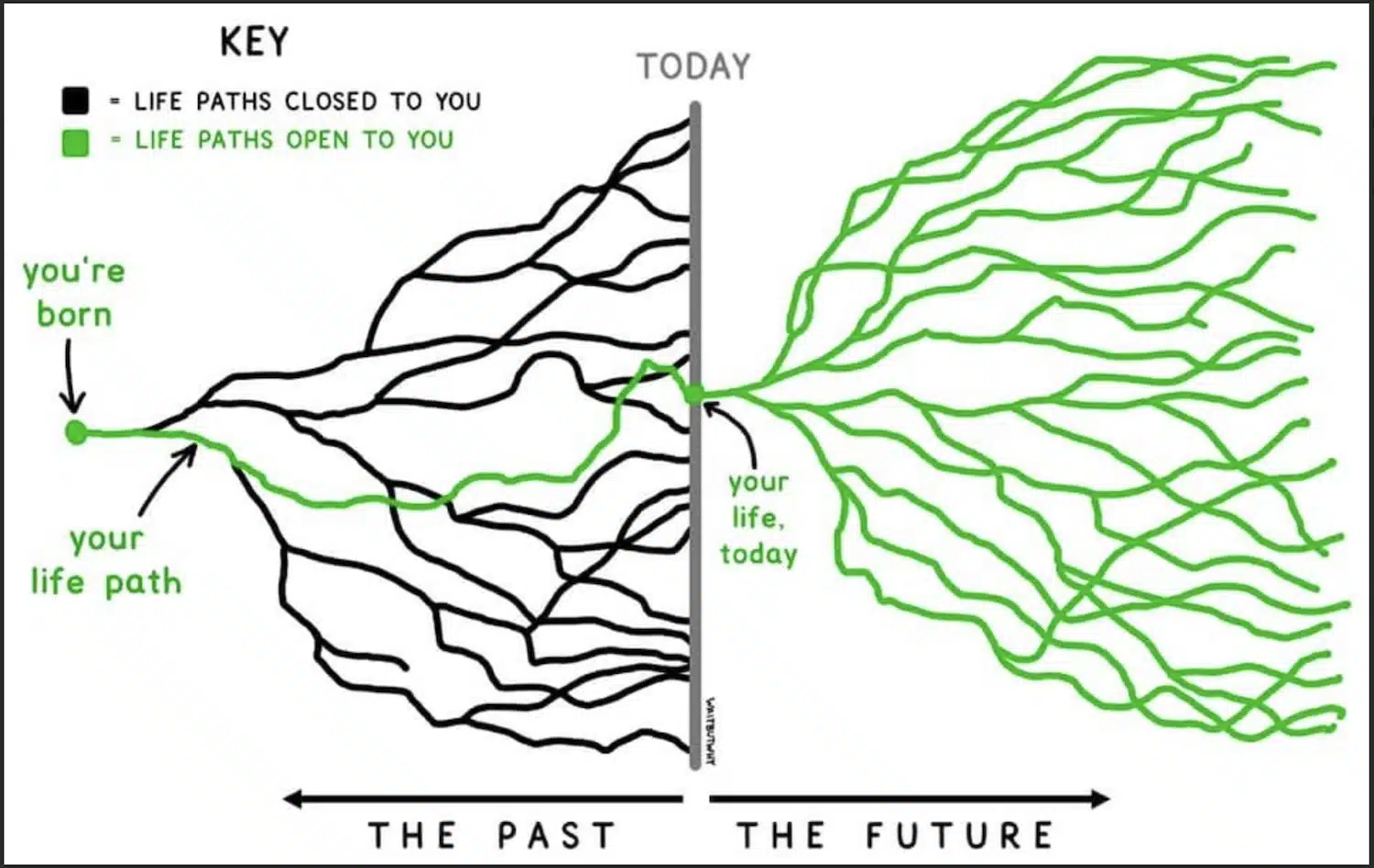You can either have broad or deep subject matter expertise. The choice is yours.
If you’re in the early or middle stage of your career, then this is the perfect time to decide whether you want to go broad or deep.
Here’s how to think about this choice and decide what’s best for your search marketing career.
The T-shaped marketer
I base my approach on the “T-shaped marketer” model: an expert in one area (vertical bar) with broader knowledge across related disciplines (horizontal bar).
This allows for specialization and versatility – a valuable combination in marketing.
There is no wrong choice. Circumstances often dictate the decision.
My starting point for these decisions is the following concept:

I revisit this concept frequently throughout the year, for myself and others.
Remember:
- You have around 40 working years.
- Even if you made a terrible call, there is time to correct it.
- There are far more things outside of your control than in your control.
- Sometimes you are lucky, sometimes you are not.
- Companies can go through explosive growth or go out of business.
The case to be a deep subject matter expert
- Deep expertise: Having an in-depth understanding of the subject matter has advantages. Knowing how to navigate strategically and technically can unlock unique opportunities that you’d be qualified for, but others would struggle with. This includes grasping the intricacies of algorithms, platform changes, staying updated with constant changes, and developing highly effective strategies.
- Demand: Generalists are more common, so demand often drives specialization. You could be an expert in a subject, vertical, or specific problem (e.g., technical SEO for Shopify sporting goods). When that problem arises, you’re well-positioned to solve it. Demand can also vary by market or company. For instance, an agency winning paid search work may spur opportunities in that area.
- Thought Leadership: Deep expertise provides a unique market perspective, enabling thought leadership. You can anticipate client needs and future trends. Specialists often become recognized authorities, writing for publications or speaking at conferences.
The case to be broad
- Versatility: Broad skills allow you to participate in diverse conversations and connect dots across disciplines. Many tactics share similarities, like keyword research for SEO and PPC, or campaign structures for paid social and search. These commonalities make your skillset more adaptable as clients’ and brands’ needs evolve.
- Big picture thinking: Hyper-specialization can make it hard to see the bigger picture. Having broader knowledge helps maintain a higher-level view. This facilitates solving complex problems like budget allocation, creative strategies or optimizing the customer journey.
- Communication and collaboration: Generalists excel at communicating across teams and departments, ensuring cohesive marketing. They can understand various tasks and requirements, helping bring projects together and resolve cross-discipline issues quickly.
5 tips to help you make your decision
Assess your strengths and passions
Consider what you genuinely enjoy and excel at.
Do you prefer diving deep into technical details, or do you thrive on variety and collaboration?
Find something you ****. Your interests greatly impact job satisfaction.
2. Consider the market
Research the demand and salary trends for specialists and generalists in your area and industry.
These fluctuate as the industry changes and evolves.
Look at companies’ roles (e.g., VP of SEO or VP of Marketing) to gauge the value of specialization or generalization as you advance.
3. Think long term
Many worry that specialization could limit relevance or career growth, with generalist roles seeming more valued.
However, both paths offer opportunities as you advance – and require continuous skill improvement.
Getting paid as a senior specialist (e.g., paid search) may be harder than a generalist, but true expertise commands a premium.
Focus on what you can control and excel at. It creates opportunities over time, though patience is key. Expertise and skill are eventually recognized and rewarded, even if it’s challenging initially.
4. Talk to people in the field
Network with professionals who have taken different paths.
Ask about their experiences, challenges faced, and rewards reaped.
Their insights can be invaluable when weighing your options.
5. Experiment and explore
Still unsure?
Try different roles or projects to experience specialization and generalization.
This can help you discover what truly resonates.
What’s the right path for you?
There’s no one-size-fits-all answer about whether you should develop broad or deep subject matter expertise.
The best path is the one that aligns with your individual strengths, interests and long-term goals.
Carefully considering these factors can help you make an informed decision that sets you up for a fulfilling and successful marketing career.
Opinions expressed in this article are those of the guest author and not necessarily Search Engine Land. Staff authors are listed here.
Source link : Searchengineland.com
